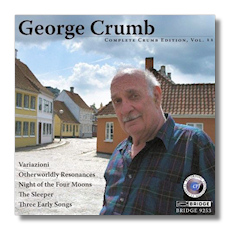
The Internet's Premier Classical Music Source
Related Links
- Crumb Reviews
- Latest Reviews
- More Reviews
-
By Composer
-
Collections
DVD & Blu-ray
Books
Concert Reviews
Articles/Interviews
Software
Audio
Search Amazon
Recommended Links
Site News
 CD Review
CD Review
George Crumb

Complete Crumb Edition, Volume 11
- Variazioni 1
- Otherwordly Resonances 2
- Night of the Four Moons 3
- The Sleeper 4
- Three Early Songs 5
3-5 Jan DeGaetani, mezzo-soprano
4,5 Gilbert Kalish, piano
2 Quattro Mani
3 The Aeolian Chamber Players
1 Odense Symphony Orchestra/Paul Mann
Bridge 9253 DDD1,2/ADD3-5 74:05
This is Volume 11 in Bridge Records' ongoing "Complete Crumb Edition," and it is at least half as good as a bride's good-luck charm: it contains something old and something new – several somethings, actually. First, we have new recordings of an old work (Variazioni for large orchestra, which dates from 1959) and of a fairly recent one (Otherworldly Resonances for two amplified pianos, composed in 2002 and revised three years later). "Something old" is a reissue of Night of the Four Moons, recorded in 1974 for Columbia Records, and licensed here by Bridge, and songs performed by Jan DeGaetani and Gilbert Kalish during a concert on February 25, 1987. In other words, this single CD encompasses 33 years of recordings and 58 years of composition.
This CD is less uneven than one might guess it to be. Night of the Four Moons, a work for alto (here a mezzo) and a typically Crumb-like ensemble (alto flute doubling piccolo, banjo, electric cello, and percussion), was composed one year before Ancient Voices of Children, another extended work with texts by Lorca. It is as much of a masterpiece as that later work, which it resembles in several ways. Crumb's immediate inspiration was the Apollo 11 mission, although Crumb being Crumb, his response to that inspiration was eclectic: allusions to Mahler's Das Lied von der Erde and Haydn's "Farewell Symphony" coexist with Crumb's use of startling extended performance techniques (the flutist whispering into his mouthpiece, for example) and elements of theatricality. (As in the "Farewell Symphony," all of the musicians save the cellist leave the stage before the work is finished, striking the crotale as they go.)
Otherworldly Resonances is also a very interesting work, not least for the sound of the instruments themselves. Unsatisfied with the one-movement version that appeared in 2002, Crumb added "Celebration and Ritual" and "Palimpsest" to "Double Helix" in 2005. The composer's fascination with multilayered, spatial music is apparent here. In the first movement, a constantly rotating four-note figure (E flat - F - C sharp, E flat) acts as an ostinato and as a scaffold on which to add embellishments. In the second, bell-like sounds dominate, and massive chords, and in the third, there are three concurrent layers which Crumb designates as "Gamma Music," "Beta Music," and "Alpha Music." The antiphonal possibilities suggested by two pianos are explored throughout. The pianists behind Quattro Mani are Susan Grace and Alice Rybak, and they are impressive indeed.
Variazioni was Crumb's first major orchestral work, and is not really typical of his maturity, except for certain coloristic effects. Its thematic material is derived from Crumb's name, and from the name of dancer Rolf Gelewski, whom Crumb met in Berlin. It was first recorded in 1980 by David Gilbert and the Louisville Orchestra. I haven't heard that recording, but Mann and the Danish players seem to do just fine here. Thoughtfully, the individual variations are separately tracked, so listeners, if they wish, can cross-reference them to the descriptions in the booklet, or can simply hear them on their own.
The Three Early Songs date from 1947, when Crumb was in his teens. Their texts are by poets Robert Southey and Sara Teasdale. These are very assured, mature settings, although they give even less of a foretaste of the composer to come than Variazioni. The Sleeper (1984) is a setting of Poe, whose text Crumb treats rather loosely, but nevertheless with sensitivity. Crumb uses the piano percussively, employing many of the coloristic devices for which he is famous, and the vocal line is both haunted and haunting.
The presence of the late Jan DeGaetani in the vocal works assures that the performances are self-recommending. She was very closely associated with Crumb's music, and he could not have asked for a better advocate. Pianist Gilbert Kalish is her idiomatic partner in the Three Early Songs and The Sleeper, and in Night of the Four Moons, four members of the Aeolian Chamber Ensemble demonstrate their Grammy-nominated mastery of Crumb's language and atmosphere for a new generation of listeners … or for an older generation that hasn't forgotten!
The booklet notes by Steven Bruns are very helpful, and despite the diversity of recording sources, the sound on this disc is consistent, and never less than excellent. Applause has been tactfully edited out (I assume) in the DeGaetani/Kalish collaborations. If you're interested in Crumb, you need this CD.
Copyright © 2008 by Raymond Tuttle




















